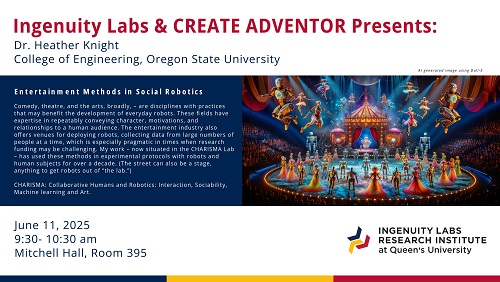Ingenuity Labs & CREATE ADVENTOR Presents: Dr. Heather Knight
Date
Wednesday June 11, 20259:30 am - 10:30 am
Location
69 Union St, Mitchell Hall, Room 395
Join us for this talk by Dr. Heather Knight. She will explain her research work with CHARISMA. This talk is open to the public.
Entertainment Methods in Social Robotics
Comedy, theatre, and the arts, broadly, – are disciplines with practices that may benefit the development of everyday robots. These fields have expertise in repeatably conveying character, motivations, and relationships to a human audience. The entertainment industry also offers venues for deploying robots, collecting data from large numbers of people at a time, which is especially pragmatic in times when research funding may be challenging. My work – now situated in the CHARISMA Lab – has used these methods in experimental protocols with robots and human subjects for over a decade. (The street can also be a stage, anything to get robots out of “the lab.”)
CHARISMA stands for Collaborative Humans and Robotics: Interaction, Sociability, Machine learning and Art. We develop robot behavioral software and interfaces that take humans into account as informed by the arts. Our past work considers expressive robots in many domains: from personal exploration (human-robot meditation retreats), to reimagining social settings (multi-robot furniture systems), to infusing robots in established cultural traditions (trick-or-treating robots), to artistic design (robot rehearsal software), to otherworldly entertainment (light equipped quadruped dance performances), to the dull, dirty, and dangerous work (intuitive controllers for robots to remove barnacles and maintain surfaces underwater). We have invented human-robot improv games, deployed multi-robot systems to run their own user studies, leveraged in-the-wild deployments to assess realworld robot systems, and produced a Robot Film Festival.
CHARISMA is powered by an interdisciplinary team of robot innovators, From undergrads to Ph.D. students to Artists-In-Residence. Our main research contributions are in Human-Robot Interaction and Social Robotics, two fields which seek to optimize the human-robot interface, integrating the fields of engineering, programming, electrical engineering, and psychology. This work has been recognized within academia (our work has over 1500 citations) and outside it (my work developing an expressive machine on a music video was recognized with a British VMA). We also develop robot rehearsal software and creatively intersect dance and acting with embodied intelligence.